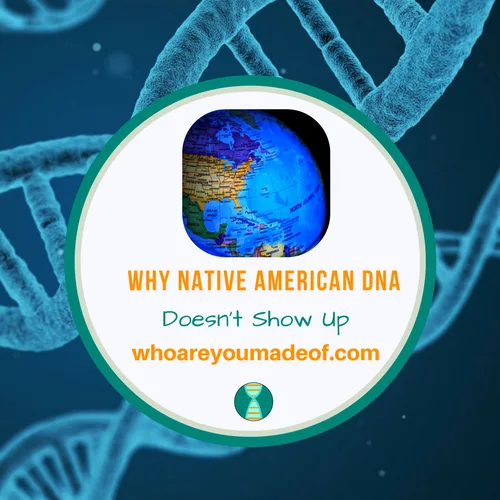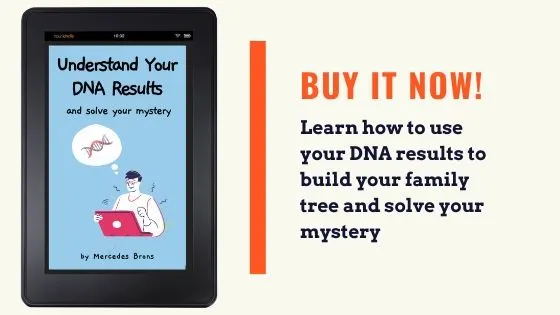Have you heard from others that Native American doesn't show up in DNA? I get this question frequently, and I've seen people suggest that Native American DNA doesn't show up on DNA tests in online forums.
In this post, we'll dispel this myth, and address some reasons that could explain why Native American doesn't show up in results as expected.

When I use the term "Native American", I am referring to the indigenous peoples of North and South America, who all share common genetic origins despite superimposed geopolitical boundaries and constraints. Modern descendants of these original inhabitants live in communities large and small all over both continents.
Some have retained a cohesive tribal identity, and others descend from people who "admixed" with newcomers from Europe, Africa, and Asia.
If you inherited Native American DNA from your ancestors, then it will probably show up on DNA tests
If you have Native American ancestors and you inherited DNA from them, then there is a good chance that Native American DNA will show up in your results. I have seen Native American ancestry represented correctly on Ancestry DNA, My Heritage DNA, Family Tree DNA, and even on third-party tools like Gedmatch.
The important fact to note is that we didn't inherit DNA from all of our ancestors, but we did inherit DNA from many of them. There is no known rhyme or reason to the way that autosomal DNA is inherited, other than the fact that each child inherits 50% of their DNA from each parent.
Even though you inherited half of your DNA from each of your parents, there is no way to know which 50% you inherited, and what information was contained within the 50% of each parents' DNA that you did not inherit.
From the DNA that you inherited from your mother, for example, you will share DNA with the ancestors from whom she inherited those segments of DNA. Contained within the DNA that she didn't pass down to you are segments that she inherited from other ancestors.
We inherit many segments from recent ancestors, and fewer segments from distant ancestors, but there is always a chance that segments from each 50% of DNA (the part you did inherit and the part you didn't inherit) could match any particular given ancestor.
This means that you may very well have Native American ancestors in your family tree, but because of the limited size of the human genome and probability, you didn't inherit any DNA from those particular ancestors.
Note: To clarify, we do share very, very small amounts of DNA with more distant ancestors than would appear as significant on autosomal DNA test in the form of larger segments (made up of these much smaller segments) that we inherited from our more recent ancestors.
How many generations does it take for Native American DNA to disappear?
In a nutshell, there is about a 18% chance that you would share no traceable DNA with any given 6th great-grandfather. Going back even just one more generation (to 7th great-grandparents) increases these odds to 37% of having no shared DNA in common.
The topic is tricky, however, so be sure to stick around for a more detailed explanation below.
I should also mention that Native American DNA does not have any special qualities that make it easier or more difficult to inherit than any other DNA ethnicity. The following discussion would be applicable to any DNA ethnicity that you were expecting to see in your results.
How Native American DNA (and other ethnicities) are inherited
As you already know, each child inherits 50% of their DNA with from each parent. The effect of this is that, with each passing generation, the descendants will share less and less DNA with any given ancestor.
You will absolutely share DNA with your parents, and you are practically guaranteed to share DNA with your grandparents, great-grandparents, great-great-grandparents, and your great-great-great grandparents.
By the time you get to the 5th great-grandparent level, however, there is about a 5% chance that you inherited no DNA from any given 5th great-grandparent. When you get to a distance of an 8th great-grandparent, there is about a 58% chance that you would share no DNA with the great-grandparent in question.
To make matters more complicated, even if you still did inherit DNA from a relatively recent ancestor, there is a good chance that you didn't inherit the Native American DNA that they did have. Remember, 50% of their DNA was not passed down to their children.
People of European and African descent have been living on the North and South American continents for about 500 years, and so we should keep in mind that a Native American ancestor might not have been "100%" Native American.
In this sense, it's possible to have inherited DNA from a Native American ancestor without showing any Native American DNA.
Basic reasons that no Native American showed up in your results
To summarize, assuming your great-great-great grandmother was 100% Native American, meaning that her ancestors never admixed with people of European and/or African descent at any point, then it would be extremely unlikely for no Native American to show up in your DNA results.
If your Native American great-great-great-grandmother was 60% Native American, however, there would be a good chance that even though you would inherit DNA from her, you might not inherit segments of her DNA that would indicate Native American ancestry.
For those of us who have Native American ancestors further back, we should keep in mind that there is only about a 42% chance that we would have inherited any measurable DNA from a Native American 8th great-grandmother, for example. If we are lucky enough to share a detectable amount of DNA with an 8th great-grandmother, it would be a very, very small quantity.
Maybe there is no Native American ancestry in your family
Finally, it's important to remember that not all of the stories that we hear growing up are true, and it is important to consider that the reason that no Native American DNA showed up in your results is because you don't have any Native American ancestors.
This is especially likely to be the case if you have already researched your family tree and have found absolutely no valid genealogical evidence to corroborate what you were told about a Native American ancestor as a child.
I didn't want to start out with this paragraph, since this can be a very sensitive subject for many people. I always give people the benefit of the doubt, and assume that if they have been told that they have Native American ancestry, then they do.
This world is tough enough without us trying to discourage each other, and it shouldn't bother us that people are curious about their family tree - no matter who they think might be on it.
How can I know for sure whether I have Native American ancestors?
Don't be discouraged if you were expecting to find Native American in your DNA results, and you didn't. Depending on how far back your Native American ancestor might be, you may or may not be able to document your family line back to that point.
I would still encourage you to start building your family tree, or if you already have one, building it further out. Document each generation carefully, learning as much as you can and paying attention to every detail. You may stumble upon a clue that can verify your Native American roots.
Conclusion
I hope that this post has helped you understand just a little bit more about how Native American ancestry is passed down from generation to generation, and why you might not have inherited the ethnicity that you were expecting to see in your results.
If you have any questions about something that you read here, please feel free to leave a comment below.
Thanks for stopping by!


Beverly
Wednesday 16th of July 2025
My Granddaughter has a full Indian Great Grandmother and her DNA test came back as 6% Indian. Her parents are Mexican Caucasian and Caucasian. I thought it would be higher.
Don Bos
Saturday 29th of March 2025
So my wife has mostly indigenous Indian genes. She’s from Mexico. Our children have about 29-32% such genes and our grandchildren have between 10 and 12% Indian genes. On the other hand my siblings and I each have some ancient Scandinavian. We each have big junks of Swiss German, Dutch, and English genes which also up for 99% of our pretty extensive tree. So the Scandinavian proof comes from small junks (2-7%)we each are assigned. For instance, I have 2% Icelandic and 7% Danish of genes. And with three sisters all having small amounts of different combinations of Swedish, Danish, Norwegian, or Icelandic genes we have the region totally covered So, maybe if you don’t have Indigenous American genes if possible have your siblings take DNA texts.
Debra Haas
Monday 24th of March 2025
WHAT DOES show up as "Native American DNA" - how is it labelled? My mother's family has a branch from the area near the CornPlanter/Seneca lands. The stories handed down from that 1 Ancestor - my ggrandfather - to his much younger half-brother, to my mother & her 1st cousins, in the 1950s - were about HIS grandmother. And the Cornplanter/Seneca of her generation were not known (as much as we can tell) to have mixed w/non-Native American/ not even other "tribes". So my "Native American Ancestor" of full blood would be my 5th or 6th generation. But I have DNA tests from my mother, her 1st cousins - same generation. Just don't know what to look for. (Same generation - African ancestor is very obvious.) Father's side - same generational spread - there should be "another Native American" link - Cherokee.
Mercedes
Monday 24th of March 2025
Hi Debra, Thank you for your interesting question! If you inherited DNA from your Native American ancestors, it usually shows up in DNA results as "Indigenous Americas" (on Ancestry). On MyHeritage, it might say something like "North and Central America" or a specific country in North or South America. Depending on where your ancestors were from, you might also see East Asian regions or Inuit. I hope this helps you, Mercedes
Vicki Hassessian
Sunday 12th of January 2025
I took a DNA test with Ancestry and my Choctaw/Chickasaw ancestor's bloodline did not show up. My sister took a test with 23 and Me and her test results came back positive for Indian blood. I'm so confused!
Susan Stockton Gastrock
Sunday 29th of December 2024
Oh my gosh! Thank you! Your explanation has totally changed my mindset. Thank you, Thank you!! Susan Stockton Gastrock